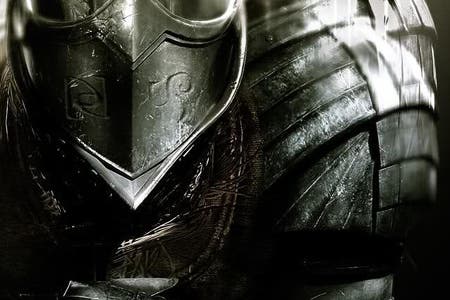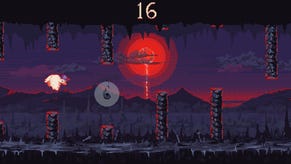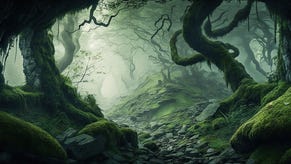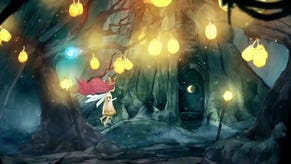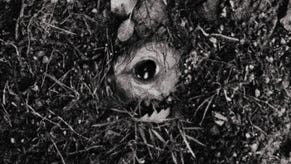Games of 2011: Dark Souls
Fireside chat.
A hazy myth, an elegant contraption, an eccentric vision, an unforgiving mistress: Dark Souls has many sides. All bear the fingerprints of creator Hidetaka Miyazaki, who in 2011 established himself as the most interesting designer working in blockbuster games today. Not that this, sequel to Sony-born Demon's Souls, has much aside from giant sales figures to identify it as a big hitter. In all other ways it eschews the churning mainstream, taking design decisions that are both unfashionable and, prior to its chart-dominating success, seemingly commercially unworkable.
Because it's a game that obscures its precise systems with the fog of misdirection, whispering clues that lead nowhere, forcing you to feel out its systems and geography, absent of any handholding. For players used to explicit goals with well-furrowed roads to reach them, this feels like play with the stabilisers removed. Indeed, when it comes to your task and the route by which you arrive at it, Dark Souls has nothing to say.
Its tutorials come as paper cut admonishments; training levels that suckerpunch you back to bonfire save points with nothing to show for your troubles but some muscle memory, a bruised ego and another plan that must be torn up and replaced with something better. Dark Souls has nothing to say to players who wish to succeed simply by showing up.
The single save slot and constant recording of progress make rewinding the clock on your history impossible and as such this is a game that asks you to own your choices like no other, wearing failures as defining scars. Dark Souls has no mechanism for players wanting quick reloads that allow them to, attempt by attempt, write the perfect journey through the game.
The complex weave of non-player character storylines carries on about you regardless of your attention, and the lines between friend and foe are blurred. Favours are just as likely to be repaid with brutal backstabbing as shiny trinkets. For players used to being repaid in gold and reverence by their virtual quest-givers, Dark Souls has nothing to say.
Instead the game relies on the messages of others to give hope and inspiration. The mystified multiplayer is quite unlike anything else in games, the opportunity for voice chat barred by Miyazaki, limiting communication to messages scrawled onto the ground by other players in their worlds, and pulled into your own. "Ambush coming up," warns one. "Shoot its tail," instructs another. In the early stages of the game the sense of asynchronous camaraderie is beguiling, even though the deliberate down scoping of the console's features feels old-fashioned.
Dark Souls is a game that calls to screen horrifying terrors, crocodile-skinned leviathans, fire-breathing drakes and obese executioners that pound toward you with single-minded urgency. But the most frightening demons are perhaps those it summons from within us. The petulant child gamer, who throws her controller at the wall in frustration; the irascible teenager who stops playing the moment he stops winning, all red-faced sulk. These are ghosts from the past we have supposedly matured away from, and yet in Lodran's stony network of brutality, they are called to the surface. Dark Souls has no words of indulgence for the bruised ego. Rather, those demons must be exorcised if you wish to progress, or embraced if you wish to submit.
And how many submitted? Few who start a video game finish it, just as so many books remain opened but unread. Games require perseverance, commitment. But in Dark Souls' case, they require skill too. Not the kind of skill that has become fashionable in games over the past two years: fetch quest persistence, hunger to gulp down drip feed experience points that offer rewards for merely turning the cogs. This is the systemic cancer that is deforming gaming's DNA, a lowering of the barrier to entry that widens the pool of players, but at the cost of a diminished sense of accomplishment.
Not all games have to be for everyone, despite capitalism's persuasive whispering in the ear of so many publishers. Dark Souls is a game for players willing to advance themselves, not just their avatar; to learn and perfect a skill, to improve. In this way, it silently summons the demons of an entire medium, before shooing them away with its single-minded philosophy.
It's not perfect, but that's somehow perfect for a game that centres itself around our imperfections. It frequently overreaches, with ambition outstripping technology in Blight-town as the framerate slows to a plod while the console strains to render the dank, cavernous walls and matchstick scaffolding. Likewise, the endgame competitive multiplayer player vs. player was ruined by some imbalanced covenant items - at least until the most recent patch - design shortcomings that stand out all the more starkly for the rest of the experience's brilliance.
Like Minecraft, the Gollum-like grip with which the game clutches its deepest secrets has forced the community outside of the game too, onto YouTube and forums and FAQs where scraps of knowledge are traded like precious gems. The value of the unspoken has been all but lost in video games, whose comprehensive tutorials and 'extras' menu options make explicit every inch of the developer's work. Dark Souls understands the worth in choosing to say nothing.
In part, that's because its silence it makes room for us to say something, and no game in 2012 has inspired not only such commentary, but also such communal storytelling. Fitting that the only moments of respite and safety in the game are bonfires, where flames scare off monsters, and warmth invites sharing. Outside of the game too, we come together around a virtual fireside, and begin to pick over our own personal stories, myths that pass from player to player, an oral tradition of play. We tell puff-chested of our victories, and murmur red-faced of our failures. There's humour and tragedy and wonder in these stories. And in them, we begin to understand that Dark Souls has so much to say. It simply asks that we are the ones to voice it.
